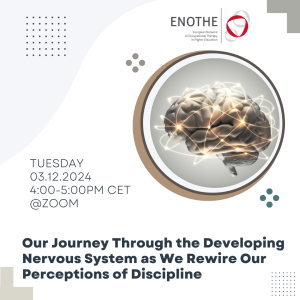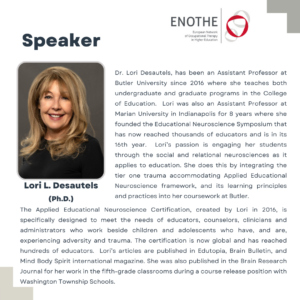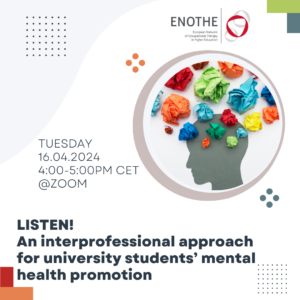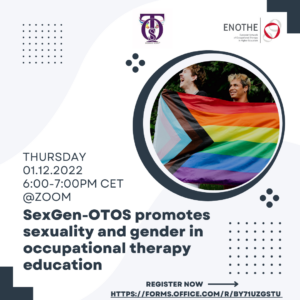Choose below the webinar you want to know more about.
- “Occupational Therapy in the analysis of Contextual factors“. Nuria Menendez. 21st January 2025
- “Our Journey Through the Developing Nervous System as We Rewire Our Perceptions of Discipline“. Lori Desautels. 3rd December 2024
- “Anticolonial Pedagogy: Utilizing the ‘Mountain of Knowledge’ Metaphor to disrupt entrenched narratives in Occupational therapy education.” Eric Nkansah Opoku. 21st May 2024
- “Teaching Diverse Groups”. Saskia Buschner. 23rd April 2024
- LISTEN! An interprofessional approach for university students’ mental health promotion. Petra Paukowitsch. 16th April 2024
- “Are children deprived of play? Problematizing, reflecting and expanding ideas of occupational deprivation.” Michelle Bergin, Silvia Veiga-Seijo, Alison Mulla. 19th September 2023.
- “Sex-GenOTOS promotes sexuality and gender in occupational therapy education”. Jaime Leite Junior, Jens Schneider. 1st December, 2022.
- “Distance and Hybrid Teaching: where do we go from here?”. 23rd June, 2022.
- “COIL (collaborative online intercultural learning) in OT – COPILOT”. Elisabeth Fattinger. 29th September, 2021.
- “Integrating Occupational Science in a Competence-Based Curriculum for Occupational Therapy Program in Finland”. Annikki Arola. 2nd June, 2021.
- “Blended learning: integrating virtual and face to face teaching in occupational therapy programmes at the University of Plymouth”. Fiona Fraser, Alison Warren. 19th May, 2021.
- “Internationalising the Curriculum (IoC) -how to start?”. Ann Johansson, Lucie Weissova. 21st April, 2021.
- “Preparation & delivery of an on-line simulated practice placement in occupational therapy during COVID-19 outbreak”. Elena Gliki. 23rd November, 2020.
“Occupational Therapy in the analysis of Contextual factors”
Speaker: Nuria Menendez
Nuria Menéndez Álvarez. Doctor in disability psychology. Occupational therapist. Teacher in the Occupational Therapy degree at the Padre Ossó Faculty (University of Oviedo). Field experience working in refugee camps.
Webinar description
Occupational therapy is defined as a profession that addresses people’s well-being through occupation. Although the occupation occupies the tasks of our daily lives, it will be influenced by the context in which it is carried out, so the occupational therapist must be able to analyze the occupation taking into account the culture and context of the person. In addition, it must be taken into account that any limitation in occupation will have an impact on the person’s health. In this sense, occupational therapists must be prepared to analyze and understand any situation of workplace injustice, including those that escape our daily reality. In this way, occupational therapy is positioned as a powerful element with which to empower those populations that find themselves in situations of occupational restriction. Occupational therapy has great value in the face of the global crises we are currently experiencing
Dr. Lori Desautels, has been an Assistant Professor at Butler University since 2016 where she teaches both undergraduate and graduate programs in the College of Education. Lori was also an Assistant Professor at Marian University in Indianapolis for 8 years where she founded the Educational Neuroscience Symposium that has now reached thousands of educators and is in its 16th year. Lori’s passion is engaging her students through the social and relational neurosciences as it applies to education. She does this by integrating the tier one trauma accommodating Applied Educational Neuroscience framework, and its learning principles and practices into her coursework at Butler. The Applied Educational Neuroscience Certification, created by Lori in 2016, is specifically designed to meet the needs of educators, counselors, clinicians and administrators who work beside children and adolescents who have, and are, experiencing adversity and trauma. The certification is now global and has reached hundreds of educators. Lori’s articles are published in Edutopia, Brain Bulletin, and Mind Body Spirit international magazine. She was also published in the Brain Research Journal for her work in the fifth-grade classrooms during a course release position with Washington Township Schools. ori continues her work co-teaching in the K-12 schools integrating her applied research into classroom procedures and transitions preparing the nervous system for learning and felt safety. Lori is the author of 4 books with more to come. Her most recent books are: Intentional Neuroplasticity, Our Educational Journey Towards Post Traumatic Growth, Connections over Compliance: Rewiring our Perceptions of Discipline. Her newest book will be a manual coming out in 2024 titled, “Body and Brain Brilliance: A manual to cultivate Awareness and Practices for our Nervous System” Lori has met with well over 200 school districts across the country, in Canada, Costa Rica, Australia, Scotland, England and Dubai equating to more than 150,000 educators with much more work to be done!
Webinar description
In this presentation, we will explore how our nervous systems are impacted by adversity, trauma, and experiences of resiliency through deepened connections and sensory regulation. Behaviours are only signals or indicators that the brain and body are struggling in survival states of functioning
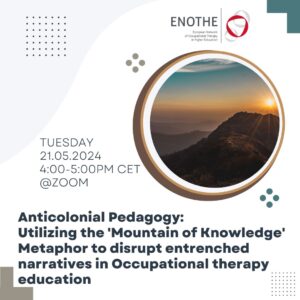
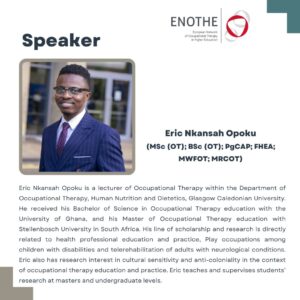
Anticolonial Pedagogy: Utilizing the ‘Mountain of Knowledge’ Metaphor to disrupt entrenched narratives in Occupational therapy education.
Conventional pedagogical approaches inadvertently perpetuate coloniality and dominant narratives (Freire, 1993[1970]; Hooks, 2003), and the field of occupational therapy is no exception. In this webinar session, we’ll delve into the transformative potential of the “Mountain of Knowledge” metaphor, a dynamic tool for fostering inclusivity, collaboration, amplifying marginalized voices within the classroom and empowering students to challenge dominant narratives within the profession. Underpinned by critical, anti-colonial and dialogic pedagogy (Freire, 1993[1970]; Freire & Shor,1987; Bakhtin, 1991), we will discuss how this metaphor promotes critical consciousness, cultural competence, and empathy among students (Kumagai &Lypson,2009, Lather, 1991), as well as learn practical strategies for its implementation in occupational therapy and occupational science education.
References:
Bakhtin, M. M. (1991). Dialogic imagination: Four essays by M. M. Bakhtin (C. Emerson & M. Holquist, Trans.). Austin, TX: University of Texas Press.
Freire, P. (1993 [1970]) Pedagogy of the Oppressed (trans. M.B. Ramos; revised edn). New York: Continuum
Freire, P. and Shor, I. (1987) A Pedagogy for Liberation: Dialogues on Transforming Education. Westport, CT: Bergin & Garvey
Hooks, B. (2003). Teaching community: A pedagogy of hope. Routledge. Kumagai, A. K., & Lypson, M. L. (2009). Beyond cultural competence: critical consciousness, social justice, and multicultural education. Academic medicine, 84(6), 782-787.
Lather, P. (1991). Getting smart: Feminist research and pedagogy within/in the postmodern. Routledge.
Author Bio:
Eric Nkansah Opoku is a lecturer of Occupational Therapy within the Department of Occupational Therapy, Human Nutrition and Dietetics, Glasgow Caledonian University. He received his Bachelor of Science in Occupational Therapy education with the University of Ghana, and his Master of Occupational Therapy education with Stellenbosch University in South Africa. His line of scholarship and research is directly related to health professional education and practice, Play occupations among children with disabilities and telerehabilitation of adults with neurological conditions. Eric also has research interest in cultural sensitivity and anti-coloniality in the context of occupational therapy education and practice. Eric teaches and supervises students’ research at masters and undergraduate levels.
Teaching Diverse groups
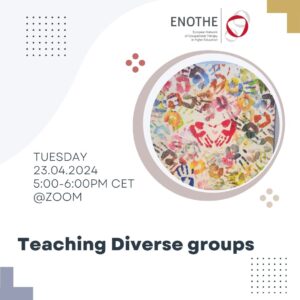
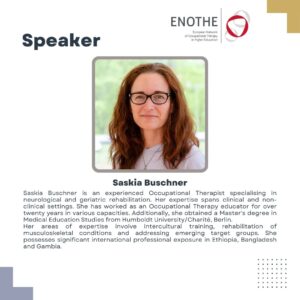
Teaching Diverse groups
Effectively teach diverse student groups is crucial in occupational therapy education and can be challenging from time to time. This lecture aims to introduce teaching strategies that enable different students to achieve the desired competences.
We will focus on two main areas. First we will have a look at „brain friendly“ methods that support students with varied learning strategies. The theory is based on neuoscience research.
In the second part we will have a closer look at students with different levels of prior knowledge. This part will be based on a Didactic Model for Inclusive Teaching and Learning (DIMILL).
As background and socialisation influence prior knowledge and learning strategies, we will also have a brief look at culture sensitivity in the teaching process.
By the end of the lecture, you will be able to apply proven teaching methods in a more targeted way and have new ideas for more inclusive teaching.
Material:
Frohn J. The Didactic Model for Inclusive Teaching and Learning. Frohn J (Ed.), 2022 Inclusive Teaching and Learning – Glossary. Berlin: Humboldt-Universität zu Berlin. https://pse.hu-berlin.de/en/research-studies/projects/fdqi-hu-en/project-results/fdqi-dimill-glossary/the-didactic-model-for-inclusive-teaching-and-learning-julia-frohn
Frohn J. Das Didaktische Modell für inklusives Lehren und Lernen. Frohn J (Ed.). 2017 FDQI-HU-Glossar. Berlin: Humboldt-Universität zu Berlin. http://www.hu-berlin.de/fdqi/glossar. https://pse.hu-berlin.de/de/forschung-und-lehre/projekte/fdqi-hu/projektergebnisse/Inklusionsglossar/das-didaktische-modell-fuer-inklusives-lehren-und-lernen
Owens MT, Tanner KD. Teaching as Brain Changing: Exploring Connections between Neuroscience and Innovative Teaching. CBE Life Sci Educ. 2017 Summer;16(2):fe2. doi: 10.1187/cbe.17-01-0005. PMID: 28450442; PMCID: PMC5459260: https://www.ncbi.nlm.nih.gov/pmc/articles/PMC5459260/pdf/fe2.pdf
Author Bio
Saskia Buschner is an experienced Occupational Therapist specialising in neurological and geriatric rehabilitation. Her expertise spans clinical and non-clinical settings. She has worked as an Occupational Therapy educator for over twenty years in various capacities. Additionally, she obtained a Master’s degree in Medical Education Studies from Humboldt University/Charité, Berlin. Her areas of expertise involve intercultural training, rehabilitation of musculoskeletal conditions and addressing emerging target groups. She possesses significant international professional exposure in Ethiopia, Bangladesh and Gambia.
LISTEN! An interprofessional approach for university students’ mental health promotion.
LISTEN! An interprofessional approach for university students’ mental health promotion.
Even prior to the Covid-19-pandemic studies showed an increase in stress levels and mental health issues among Austrian university students. Therefore, the project “LISTEN! Living Interconnected Student Engagement” was created by Occupational Therapists and rolled out within the FH Campus Wien University of Applied Sciences. LISTEN!’s theoretical base lies within the Okanagan Charta for Health Promoting Universities and Colleges (2015), as well as the Conceptual Model of the Relationship of Social Networks & Social Support to Health (Glanz et al., 2008).
LISTEN!’s approach is highly interprofessional, participatory, and centred around the community of students and employees, and their mental health. The project’s three pillars are (1) peer-counselling among students, (2) social networking opportunities for students, and (3) workshops for employees to gain skills when dealing with vulnerable students. The construction of LISTEN! facilitates a transfer to other universities. LISTEN! is partly funded by Vienna Health Promotion (WiG).
References
Glanz, K., Rimer, B.K., Viswanath, K.V. (2008): Health Behavior and Health Education: Theory, research, and practice, 4. Auflage, San Francisco. https://www.med.upenn.edu/hbhe4/part3-ch9-key-constructs-conceptual-model.shtml
Okanagan Charter: An International Charter for Health Promoting Universities and Colleges (2015). An outcome of the 2015 International Conference on Health Promoting Universities and Colleges / VII International Congress. Kelowna. British Columbia, Canada.
Unger, M., Binder, D., Dibiasi, A., Engleder, J., Schubert, N., Terzieva, B., Thaler B., Zaussinger, S., & Zucha, V. (2020). Studierenden-Sozialerhebung 2019 – Kernbericht. Institut für Höhere Studien – Institute for Advanced Studies (IHS), Wien.
Author Bio
Petra Paukowitsch, BSc MA Occupational Therapist, Social Worker
Academic Staff at FH Campus Wien University of Applied Sciences, Austria
Department of Health Sciences / Occupational Therapy
petra.paukowitsch@fh-campuswien.ac.at
“Are children deprived of play? Problematizing, reflecting and expanding ideas of occupational deprivation.”
The need for critical reflexivity and dialogue on occupational science concepts and multidimensional constructs such as inclusion, justice and deprivation is necessary to advance the translation of theoretical understandings to practices.
In this webinar, Silvia, Allison and Michelle aim to problematize, reflect and expand on ideas of deprivation and hope to:
- Spark critical reflections about representations of deprivation and occupational deprivation;
- Share insights from current research projects on differing dimensions of children’s play, as part of our doctoral studies on the P4Play program (https://www.p4play.eu/) problematizing dominant ideas about deprivation;
- Consider how we can connect these reflections on occupational deprivation within our practices as occupational therapists and educators and share resources.
We will create space for dialogue and invite participants to consider in advance how they understand the concepts of deprivation and occupational deprivation and how these relate to their current practices.
“Sex-GenOTOS promotes sexuality and gender in occupational therapy education”
The network coordinators Jaime Daniel Leite Junior and Jens Schneider will present the “International Network on Sexualities and Genders within Occupational Therapy and Occupational Science (SexGen-OTOS)” in this webinar. The network brings together occupational therapists and occupational scientists from around the world who work, teach, study and/or develop research on sexualities and genders from occupational therapy and occupational science perspectives. Currently, the network has over 100 members from 18 countries. Their work recognizes the power relations that characterize societies and the ways in which these lead to the marginalization of individuals and groups. In light of this, the members are committed to the human, social, political, civil and occupational rights of all people, including the understanding that all different sexualities and genders should be respected and valued. The network is structured into four working areas, one of which is “OT & OS education”. The aim of this area is to initiate projects together with study and training programmes within occupational therapy and occupational science. The coordinators’ presentation aims to shed light on the area of “OT & OS education”. Initial recommendations will be provided on how sexualities and genders can be taught in study and training programmes within occupational therapy and occupational science. Finally, we will discuss a research project in the field of education that is currently being planned.
“Distance and Hybrid Teaching: where do we go from here?”
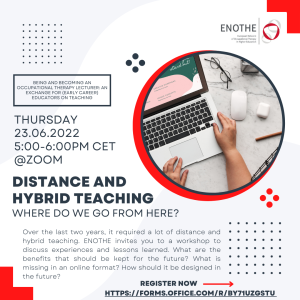
“COIL (collaborative online intercultural learning) in OT – COPILOT”

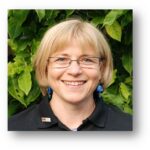
Elisabeth Fattinger
FH JOANNEUM University of Applied Sciences (FHJ)
Austria
New challenges and chances in our global, technology-focused, and fast-changing modern-day society require a new set of competences from young health care professionals, often referred to as “21st century” skills: cultural sensitivity, efficient collaboration in diverse teams, problem-solving, and critical and creative thinking. Collaborative online intercultural learning in OT education can make a huge contribution to the development of these skills and can reach all our students, not just those who go abroad. So– how can we provide it? The Erasmus+ project COPILOT (Cooperative Online Peer & Intercultural Learning in Occupational Therapy), consisting of six OT degree programs from Austria, Belgium, Bulgaria, Sweden, Switzerland and the Netherlands, has created and tested a model, nine online modules, a manual with practical tips as well as supporting resources that allow you to implement this kind of learning in your OT program. For more information, please browse Course: COPILOT Webinar (fh-joanneum.at) (please register and then click “enroll as a student”). The webinar is meant as a hands-on introduction to COPILOT learning: After a brief survey of basics (model, material), we will go through the seven steps of implementation to show you how to use our OT-related online modules for collaborative intercultural learning at your institution. Time will be set aside for your questions!
“Integrating Occupational Science in a Competence-Based Curriculum for Occupational Therapy Program in Finland”

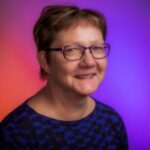
Annikki Arola, PhD
Principal lecturer in Occupational Therapy
Arcada UAS Helsinki, Finland
Higher Education has a responsibility to empower students with an innovative approach and competence to drive social change. These issues can be addressed by a recognition of Occupational Science (OS) as a core base in the Occupational Therapy (OT) education. This broadens the occupational therapists´ competence to work with occupational challenges that starts with individuals, continues to communities and advances to whole populations regardless of cultural context. In this webinar we will present and discuss the results of a long term and systematic work with a competence-based curriculum development in occupational therapy program. Curriculum was developed by choosing concepts from OS and to progressively integrate them in major subject throughout the OT studies.
“Blended learning: integrating virtual and face to face teaching in occupational therapy programmes at the University of Plymouth”
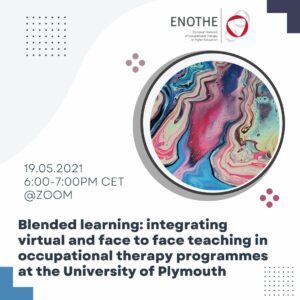

Fiona Fraser
Programme Lead for MOccTh (Hons)Occupational Therapy
University of Plymouth
United Kingdom

Dr Alison Warren
Academic Lead for Occupational Therapy
University of Plymouth
United Kingdom
This webinar will provide an overview of the transition into blended learning at the University of Plymouth though sharing some of the successes and the challenges faced. It provides an opportunity for all to reflect on blended learning and its future in occupational therapy education.
“Internationalising the Curriculum (IoC) – how to start?”
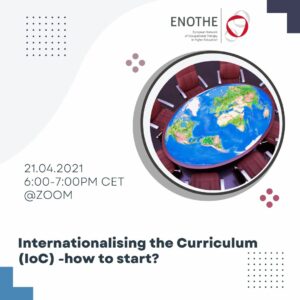

Ann Johansson
Senior lecturer
School of Health and Welfare
Jönköping University
Sweden

Lucie Weissova
International Relations Manager
International Office
Jönköping University
Sweden
Globalisation is step by step reshaping the landscape of higher education and making new demands of higher education institutions to prepare its graduate to the challenge of living and working in a globally connected world. The internationalised curriculum will acknowledge the importance of intercultural and international skills and knowledge and the ability to think and act in a local, nation and global context. Ann and Lucie will unpack the IoC notion, present the key concept and the rationales for internationalising the curriculum. Further they will present a tool for starting and continuing the IoC process and some practical suggestion for the work.
“Preparation & delivery of an on-line simulated practice placement in occupational therapy during COVID-19 outbreak”
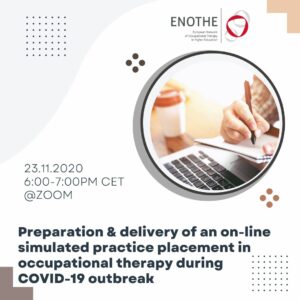
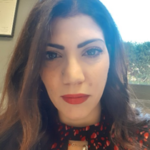
Elena Gliki, OT, MEd., BSc (Hons)
Programme Leader BSc (Hons) Occupational Therapy
Metropolitan College, Athens, Greece (Maroussi Campus)
Aim: to give an overview of the placement simulation and discuss ways to overcome the difficulties in occupational therapy education caused by the outbreak around the world.




